定义: 在计算机科学中,抽象语法树是源代码语法结构的一种抽象表示。它以树状的形式表现编程语言的语法结构,树上的每个节点都表示源代码中的一种结构。之所以说语法是“抽象”的,是因为这里的语法并不会表示出真实语法中出现的每个细节。
从定义中我们只需要知道一件事就行,那就是 AST 是一种树形结构,并且是某种代码的一种抽象表示。
在线可视化网站:https://astexplorer.net/ ,利用这个网站我们可以很清晰的看到各种语言的 AST 结构。
estree 就是 es 语法对应的标准 AST,作为一个前端也比较方便理解。我们以官方文档为例
https://github.com/estree/estree/blob/master/es5.md
1 . 下面看一个代码
console.log('1')
AST 为
{
"type": "Program",
"start": 0, // 起始位置
"end": 16, // 结束位置,字符长度
"body": [
{
"type": "ExpressionStatement", // 表达式语句
"start": 0,
"end": 16,
"expression": {
"type": "CallExpression", // 函数方法调用式
"start": 0,
"end": 16,
"callee": {
"type": "MemberExpression", // 成员表达式 console.log
"start": 0,
"end": 11,
"object": {
"type": "Identifier", // 标识符,可以是表达式或者结构模式
"start": 0,
"end": 7,
"name": "console"
},
"property": {
"type": "Identifier",
"start": 8,
"end": 11,
"name": "log"
},
"computed": false, // 成员表达式的计算结果,如果为 true 则是 console[log], false 则为 console.log
"optional": false
},
"arguments": [ // 参数
{
"type": "Literal", // 文字标记,可以是表达式
"start": 12,
"end": 15,
"value": "1",
"raw": "'1'"
}
],
"optional": false
}
}
],
"sourceType": "module"
}2 . 看两个稍微复杂的代码
const b = { a: 1 };
const { a } = b;function add(a, b) {
return a + b;
}这里建议读者自己将上述代码复制进上面提到的网站中,自行理解 estree 的各种节点类型。当然了,我们也不可能看一篇文章就记住那么多类型,只要心里有个大致的概念即可。
由 JavaScript 编写的 JavaScript 解析器,类似的解析器还有很多,比如 Esprima[3] 和 Shift[4] ,关于他们的性能,Esprima 的官网给了个测试地址[5],但是由于 acron 代码比较精简,且 webpack 和 eslint 都依赖 acorn,因此我们这次从 acorn 下手,了解如何使用 AST。
acorn 的操作很简单
import * as acorn from 'acorn';
const code = 'xxx';
const ast = acorn.parse(code, options)这样我们就能拿到代码的 ast 了,options 的定义如下
interface Options {
ecmaVersion: 3 | 5 | 6 | 7 | 8 | 9 | 10 | 11 | 12 | 13 | 2015 | 2016 | 2017 | 2018 | 2019 | 2020 | 2021 | 2022 | 'latest'
sourceType?: 'script' | 'module'
onInsertedSemicolon?: (lastTokEnd: number, lastTokEndLoc?: Position) => void
onTrailingComma?: (lastTokEnd: number, lastTokEndLoc?: Position) => void
allowReserved?: boolean | 'never'
allowReturnOutsideFunction?: boolean
allowImportExportEverywhere?: boolean
allowAwaitOutsideFunction?: boolean
allowSuperOutsideMethod?: boolean
allowHashBang?: boolean
locations?: boolean
onToken?: ((token: Token) => any) | Token[]
onComment?: ((
isBlock: boolean, text: string, start: number, end: number, startLoc?: Position,
endLoc?: Position
) => void) | Comment[]
ranges?: boolean
program?: Node
sourceFile?: string
directSourceFile?: string
preserveParens?: boolean
}获得 ast 之后我们想还原之前的函数怎么办,这里可以使用 astring[6]
import * as astring from 'astring';
const code = astring.generate(ast);接下来我们就可以利用 AST 来实现一些字符串匹配不太容易实现的操作,比如将普通函数转化为箭头函数。
我们先来看两个函数的AST有什么区别
function add(a, b) {
return a + b;
}const add = (a, b) => {
return a + b;
}{
"type": "Program",
"start": 0,
"end": 41,
"body": [
{
"type": "FunctionDeclaration",
"start": 0,
"end": 40,
"id": {
"type": "Identifier",
"start": 9,
"end": 12,
"name": "add"
},
"expression": false,
"generator": false,
"async": false,
"params": [
{
"type": "Identifier",
"start": 13,
"end": 14,
"name": "a"
},
{
"type": "Identifier",
"start": 16,
"end": 17,
"name": "b"
}
],
"body": {
"type": "BlockStatement",
"start": 19,
"end": 40,
"body": [
{
"type": "ReturnStatement",
"start": 25,
"end": 38,
"argument": {
"type": "BinaryExpression",
"start": 32,
"end": 37,
"left": {
"type": "Identifier",
"start": 32,
"end": 33,
"name": "a"
},
"operator": "+",
"right": {
"type": "Identifier",
"start": 36,
"end": 37,
"name": "b"
}
}
}
]
}
}
],
"sourceType": "module"
}
{
"type": "Program",
"start": 0,
"end": 43,
"body": [
{
"type": "VariableDeclaration",
"start": 0,
"end": 43,
"declarations": [
{
"type": "VariableDeclarator",
"start": 6,
"end": 43,
"id": {
"type": "Identifier",
"start": 6,
"end": 9,
"name": "add"
},
"init": {
"type": "ArrowFunctionExpression",
"start": 12,
"end": 43,
"id": null,
"expression": false,
"generator": false,
"async": false,
"params": [
{
"type": "Identifier",
"start": 13,
"end": 14,
"name": "a"
},
{
"type": "Identifier",
"start": 16,
"end": 17,
"name": "b"
}
],
"body": {
"type": "BlockStatement",
"start": 22,
"end": 43,
"body": [
{
"type": "ReturnStatement",
"start": 28,
"end": 41,
"argument": {
"type": "BinaryExpression",
"start": 35,
"end": 40,
"left": {
"type": "Identifier",
"start": 35,
"end": 36,
"name": "a"
},
"operator": "+",
"right": {
"type": "Identifier",
"start": 39,
"end": 40,
"name": "b"
}
}
}
]
}
}
}
],
"kind": "const"
}
],
"sourceType": "module"
}找到区别之后我们就可以有大致的思路
1 . 找到 FunctionDeclaration
2 . 将其替换为VariableDeclaration``VariableDeclarator 节点
3 . 在 VariableDeclarator 节点的 init 属性下新建 ArrowFunctionExpression 节点
4 . 并将 FunctionDeclaration 节点的相关属性替换到 ArrowFunctionExpression 上即可
但是由于 acorn 处理的 ast 只是单纯的对象,并不具备类似 dom 节点之类的对节点的操作能力,如果需要操作节点,需要写很多工具函数, 所以我这里就简单写一下。
import * as acorn from "acorn";
import * as astring from 'astring';
import { createNode, walkNode } from "./utils.js";
const code = 'function add(a, b) { return a+b; } function dd(a) { return a + 1 }';
console.log('in:', code);
const ast = acorn.parse(code);
walkNode(ast, (node) => {
if(node.type === 'FunctionDeclaration') {
node.type = 'VariableDeclaration';
const variableDeclaratorNode = createNode('VariableDeclarator');
variableDeclaratorNode.id = node.id;
delete node.id;
const arrowFunctionExpressionNode = createNode('ArrowFunctionExpression');
arrowFunctionExpressionNode.params = node.params;
delete node.params;
arrowFunctionExpressionNode.body = node.body;
delete node.body;
variableDeclaratorNode.init = arrowFunctionExpressionNode;
node.declarations = [variableDeclaratorNode];
node.kind = 'const';
}
})
console.log('out:', astring.generate(ast))结果如下

// 用螺丝刀解析机器
const ast = recast.parse(code);
// ast可以处理很巨大的代码文件
// 但我们现在只需要代码块的第一个body,即add函数
const add = ast.program.body[0]
console.log(add)
// 引入变量声明,变量符号,函数声明三种“模具”
const {variableDeclaration, variableDeclarator, functionExpression} = recast.types.builders
// 将准备好的组件置入模具,并组装回原来的ast对象。
ast.program.body[0] = variableDeclaration("const", [
variableDeclarator(add.id, functionExpression(
null, // Anonymize the function expression.
add.params,
add.body
))
]);
//将AST对象重新转回可以阅读的代码
const output = recast.print(ast).code;
console.log(output)这里只是示例代码,展示 recast 的一些操作,最好的情况还是能遍历节点自动替换。
这样我们就完成了将普通函数转换成箭头函数的操作,但 ast 的作用不止于此,作为一个前端在工作中可能涉及 ast 的地方,就是自定义 eslint 、 stylelint 等插件,下面我们就趁热打铁,分别实现。
ESlint 使用 Espree (基于 acron) 解析 js 代码,利用 AST 分析代码中的模式,且完全插件化。
工作中我们最常接触的就是 eslint 的配置,我们写的插件也需要从这里配置从而生效
// .eslintrc.js
moudule.export = {
extends: ['eslint:recommend'],
parser: '@typescript-eslint/parser', // 解析器,
plugins: ['plugin1'], // 插件
rules: {
semi: ['error', 'alwayls'],
quotes: ['error', 'double'],
'plugin1/rule1': 'error',
},
processor: '', // 特定文件中使用 eslint 检测
}parser,默认使用 espree[8],对 acorn[9] 的一层封装,将 js 代码转化为抽象语法树 AST。
import * as espree from "espree";
const ast = espree.parse(code);经常使用的还有 @typescript-eslint/parser[10] ,这里可以拓展 ts 的 lint;
eslint 官方也有个介绍,如何给 eslint 做贡献 https://eslint.org/docs/developer-guide/contributing/
1 . 安装 yeoman 并初始化环境,yeoman 就是一个脚手架,方便创建 eslint 的插件和 rule
npm install -g yo generator-eslint
创建一个插件文件夹并进入
创建 plugin
yo eslint:plugin
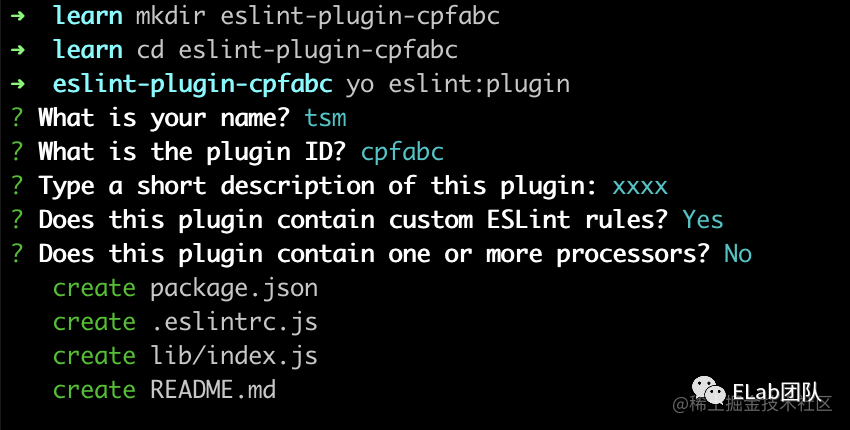
最重要的是 ID,这样插件发布之后,会以 eslint-plugin-[id] 的形式发布到 npm 上,不可以使用特殊字符。
创建 rule 规则
yo eslint:rule
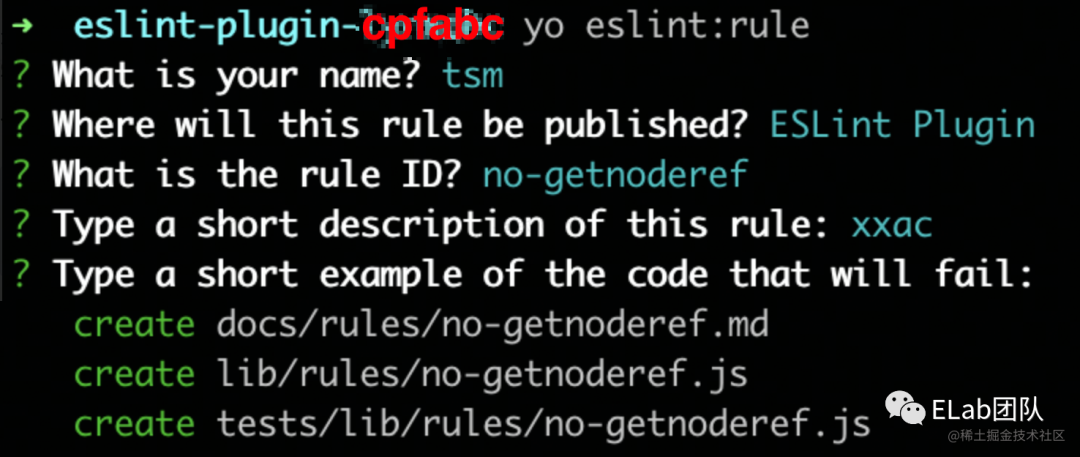
这里的 id 会生成 eslint-plugin-[id] 插件唯一标识符
生成的文件列表为
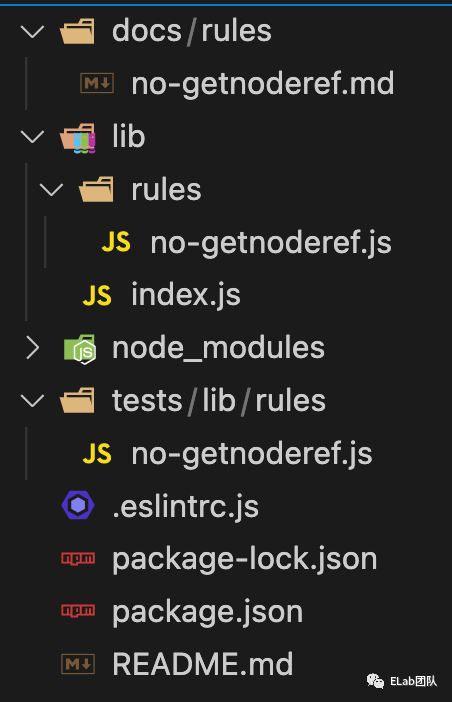
这时候我们可以回头看一下刚刚生成的文件
rules/cpf-plugin.js
可以参考
https://cn.eslint.org/docs/developer-guide/working-with-rules
/**
* @fileoverview cpf better
* @author tsutomu
*/
"use strict";
//------------------------------------------------------------------------------
// Rule Definition
//------------------------------------------------------------------------------
/**
* @type {import('eslint').Rule.RuleModule}
*/
module.exports = {
meta: { // 这条规则的元数据,
type: null, // 类别 `problem`, `suggestion`, or `layout`
docs: { // 文档
description: "cpf better",
category: "Fill me in",
recommended: false,
url: null, // URL to the documentation page for this rule
},
fixable: null, // Or `code` or `whitespace`
schema: [], // 重点, eslint 可以通过识别参数从而避免无效的规则配置 Add a schema if the rule has options
},
create(context) {
// variables should be defined here
//----------------------------------------------------------------------
// Helpers
//----------------------------------------------------------------------
// any helper functions should go here or else delete this section
//----------------------------------------------------------------------
// Public
//----------------------------------------------------------------------
return {
// visitor functions for different types of nodes
};
},
};Eslint 的插件需要根据它规定的特定规则进行编写
JSONSchema 定义 https://json-schema.org/understanding-json-schema/
大致有两种形式,enum 和 object
schema: [
{
"enum": ["always", "never"]
},
{
"type": "object",
"properties": { // 这里的意思就是可以有个叫 exceptRange 的参数,值为布尔类型
"exceptRange": {
"type": "boolean"
}
},
"additionalProperties": false
}
]context.report 上报错误和context.getSourceCode 获取源代码。 create(context: RuleContext): RuleListener;
interface RuleContext {
id: string;
options: any[];
settings: { [name: string]: any };
parserPath: string;
parserOptions: Linter.ParserOptions;
parserServices: SourceCode.ParserServices;
getAncestors(): ESTree.Node[];
getDeclaredVariables(node: ESTree.Node): Scope.Variable[];
getFilename(): string;
getPhysicalFilename(): string;
getCwd(): string;
getScope(): Scope.Scope;
getSourceCode(): SourceCode;
markVariableAsUsed(name: string): boolean;
report(descriptor: ReportDescriptor): void;
}写自己的插件之前,不妨看下官方的插件源码,也更方便理解里面的各种概念。
/**
* @fileoverview Rule to flag use of console object
* @author Nicholas C. Zakas
*/
"use strict";
//------------------------------------------------------------------------------
// Requirements
//------------------------------------------------------------------------------
const astUtils = require("./utils/ast-utils");
//------------------------------------------------------------------------------
// Rule Definition
//------------------------------------------------------------------------------
/** @type {import('../shared/types').Rule} */
module.exports = {
meta: {
type: "suggestion",
docs: {
description: "disallow the use of `console`",
recommended: false,
url: "https://eslint.org/docs/rules/no-console"
},
schema: [
{
type: "object",
properties: {
allow: {
type: "array",
items: {
type: "string"
},
minItems: 1,
uniqueItems: true
}
},
additionalProperties: false
}
],
messages: {
unexpected: "Unexpected console statement."
}
},
create(context) {
const options = context.options[0] || {};
const allowed = options.allow || [];
/**
* Checks whether the given reference is 'console' or not.
* @param {eslint-scope.Reference} reference The reference to check.
* @returns {boolean} `true` if the reference is 'console'.
*/
function isConsole(reference) {
const id = reference.identifier;
return id && id.name === "console";
}
/**
* Checks whether the property name of the given MemberExpression node
* is allowed by options or not.
* @param {ASTNode} node The MemberExpression node to check.
* @returns {boolean} `true` if the property name of the node is allowed.
*/
function isAllowed(node) {
const propertyName = astUtils.getStaticPropertyName(node);
return propertyName && allowed.indexOf(propertyName) !== -1;
}
/**
* Checks whether the given reference is a member access which is not
* allowed by options or not.
* @param {eslint-scope.Reference} reference The reference to check.
* @returns {boolean} `true` if the reference is a member access which
* is not allowed by options.
*/
function isMemberAccessExceptAllowed(reference) {
const node = reference.identifier;
const parent = node.parent;
return (
parent.type === "MemberExpression" &&
parent.object === node &&
!isAllowed(parent)
);
}
/**
* Reports the given reference as a violation.
* @param {eslint-scope.Reference} reference The reference to report.
* @returns {void}
*/
function report(reference) {
const node = reference.identifier.parent;
context.report({
node,
loc: node.loc,
messageId: "unexpected"
});
}
return {
"Program:exit"() {
const scope = context.getScope(); // 获取当前作用域,及全局作用域
const consoleVar = astUtils.getVariableByName(scope, "console"); // 向上遍历,查找
const shadowed = consoleVar && consoleVar.defs.length > 0; // 这里是判断别名
/*
* 'scope.through' includes all references to undefined
* variables. If the variable 'console' is not defined, it uses
* 'scope.through'.
*/
// 如果 console 是未定义的,那么他就在 scope.through 中
const references = consoleVar
? consoleVar.references
: scope.through.filter(isConsole);
if (!shadowed) {
references
.filter(isMemberAccessExceptAllowed)
.forEach(report);
}
}
};
}
};对照看一下console.log 的ast ,在最上面
interface Scope {
type:
| "block"
| "catch"
| "class"
| "for"
| "function"
| "function-expression-name"
| "global" // 及 Program
| "module"
| "switch"
| "with"
| "TDZ";
isStrict: boolean;
upper: Scope | null; // 父级作用域
childScopes: Scope[]; // 子级作用域
variableScope: Scope;
block: ESTree.Node;
variables: Variable[]; // 变量
set: Map<string, Variable>; // 变量 set 便于快速查找
references: Reference[]; // 此范围所有引用的数组
through: Reference[]; // 由未定义的变量组成的数组
functionExpressionScope: boolean;
}Scope 相关的源码可以参考 https://github.com/estools/escope,scope 可视化可以看这里 http://mazurov.github.io/escope-demo/
这里的 through 就是当前作用域无法解析的变量,比如
function a() {
function b() {
let c = d;
}
}这里面明显是 d 无法解析,那么
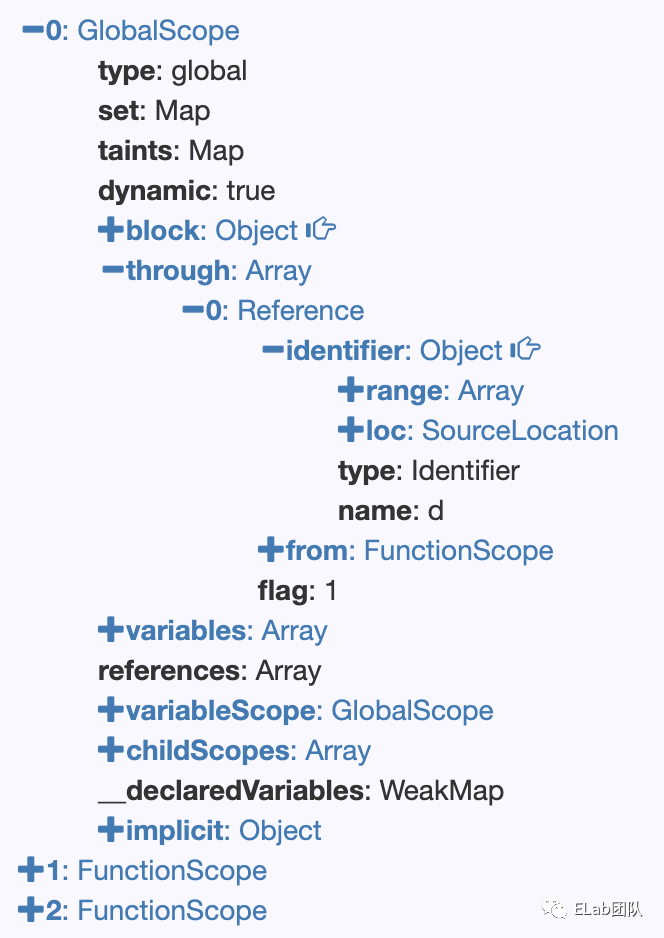
可以再 report 中调用 fix 相关的函数来进行修复,下面是 fix 的
interface RuleFixer {
insertTextAfter(nodeOrToken: ESTree.Node | AST.Token, text: string): Fix;
insertTextAfterRange(range: AST.Range, text: string): Fix;
insertTextBefore(nodeOrToken: ESTree.Node | AST.Token, text: string): Fix;
insertTextBeforeRange(range: AST.Range, text: string): Fix;
remove(nodeOrToken: ESTree.Node | AST.Token): Fix;
removeRange(range: AST.Range): Fix;
replaceText(nodeOrToken: ESTree.Node | AST.Token, text: string): Fix;
replaceTextRange(range: AST.Range, text: string): Fix;
}
interface Fix {
range: AST.Range;
text: string;
}用法为
report(context, message, type, {
node,
loc,
fix: (fixer) {
return fixer.inserTextAfter(token, string);
}
})可以看下 eqeqeq 的写法,这是一个禁用 ==``!= 并且修复为=== !==的规则
return {
BinaryExpression(node) {
const isNull = isNullCheck(node);
if (node.operator !== "==" && node.operator !== "!=") {
if (enforceInverseRuleForNull && isNull) {
report(node, node.operator.slice(0, -1));
}
return;
}
if (config === "smart" && (isTypeOfBinary(node) ||
areLiteralsAndSameType(node) || isNull)) {
return;
}
if (!enforceRuleForNull && isNull) {
return;
}
report(node, `${node.operator}=`);
}
};修复的代码在 report 中
function report(node, expectedOperator) {
const operatorToken = sourceCode.getFirstTokenBetween(
node.left,
node.right,
token => token.value === node.operator
);
context.report({
node,
loc: operatorToken.loc,
messageId: "unexpected",
data: { expectedOperator, actualOperator: node.operator },
fix(fixer) {
// If the comparison is a `typeof` comparison or both sides are literals with the same type, then it's safe to fix.
if (isTypeOfBinary(node) || areLiteralsAndSameType(node)) {
return fixer.replaceText(operatorToken, expectedOperator);
}
return null;
}
});
}1 . 实现一个禁用 getNodeRef 的插件
当我们在内部使用的跨端框架中使用下面的配置之后,将不再支持 getNodeRef 属性,取而代之的是使用 createSelectorQuery
compilerNGOptions: {
removeComponentElement: true,
},首先我们先看一下 getNodeRef 的用法
class A extends C {
componmentDidMount() {
this.getNodeRef('');
}
}在上面的可视化网站中可以看到下面的
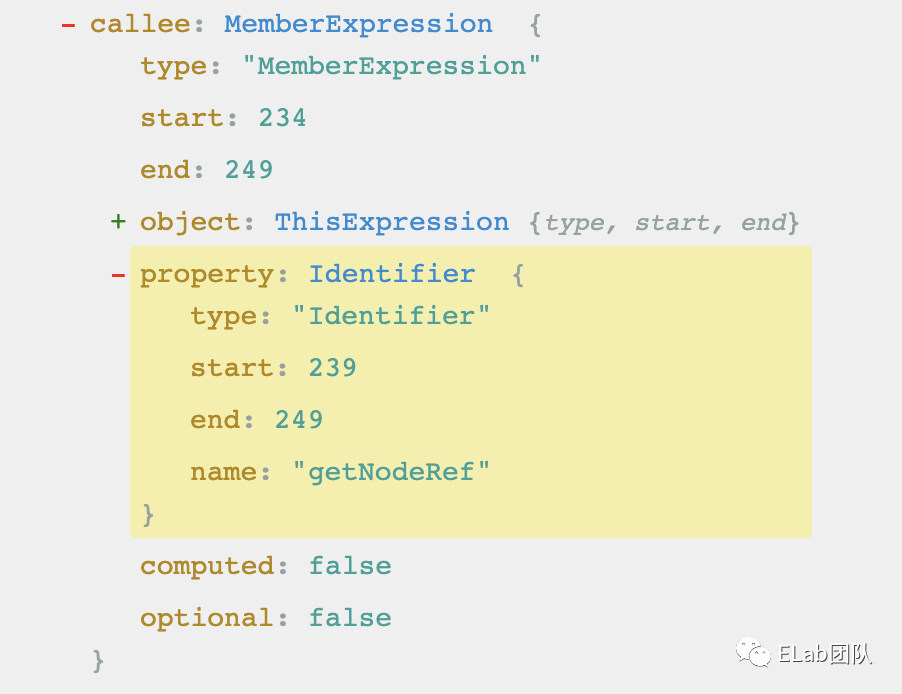
return {
// visitor functions for different types of nodes
CallExpression: (node) => {
if(node.callee.property && node.callee.property.name === 'getNodeRef' && node.callee.object.type === 'ThisExpression') {
context.report({
node,
message: '禁用 getNodeRef'
})
}
}
};测试的代码
const ruleTester = new RuleTester();
ruleTester.run("no-getnoderef", rule, {
valid: [
// give me some code that won't trigger a warning
{
code: 'function getNodeRef() {}; getNodeRef();'
}
],
invalid: [{
code: " this.getNodeRef('');",
errors: [{
message: "禁用 getNodeRef",
type: "CallExpression"
}],
}, ],
});测试的结果
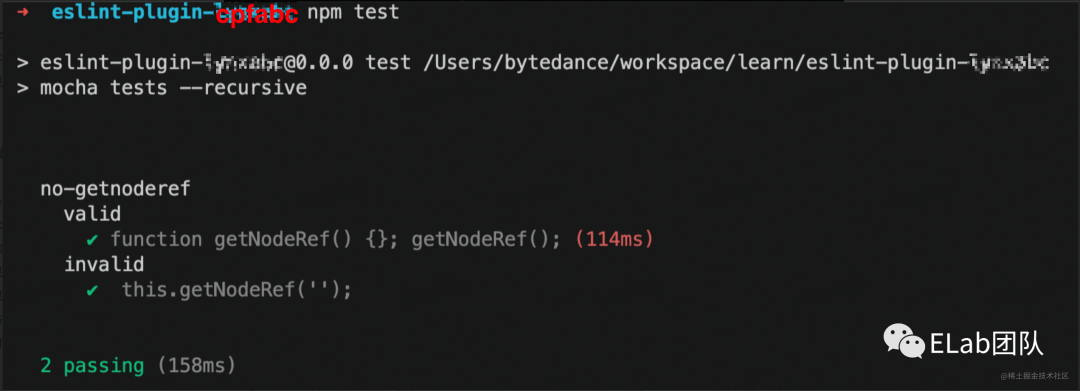
并没有什么实际的用处,仅仅是因为我们使用的框架中的 scroll event 有 bug,android 和 IOS 端参数有问题,安卓的 e.detail.scrollHeight 对应 ios 的 e.detail.scrollTop,再次说明,这是个框架的 bug,在这里使用仅仅为了演示 eslint 编写插件的一些能力。
我们的预期目标是在同一个函数中,如果使用了上述一个属性和没有使用另一个属性,则出现提示。
代码为
return {
// visitor functions for different types of nodes
"Identifier": (node) => {
if((node.name === 'scrollHeight' || node.name === 'scrollTop') && node.parent && node.parent.object.property.name === 'detail') {
const block = findUpperNode(node, 'BlockStatement');
if(block) {
let checked = false;
walkNode(block, (_node) => {
if(_node.type === 'Identifier' && _node.name === IDENTIFIERS[node.name]) {
checked = true;
return true;
}
return false;
});
if(!checked) {
context.report({node, message: `缺少 ${IDENTIFIERS[node.name]}`})
}
}
}
}
};测试代码如下
ruleTester.run("care-about-scroll", rule, {
valid: [
// give me some code that won't trigger a warning
{
code: "function handleScroll(e) { var a = e.detail.scrollTop; var b = e.detail.scrollHeight; }"
}
],
invalid: [{
code: "function handleScroll(e) { var a = e.detail.scrollTop; }",
errors: [{
message: "缺少 scrollHeight",
type: "Identifier"
}],
}, ],
});登录之后直接发布即可
npm publish

首先按照刚刚发布的插件
npm i eslint-plugin-cpf -D
在 eslintrc.js 中新增配置
moudule.exports = {
plugins: ['cpfabc'],
rules: {
'cpfabc/no-getnoderef': 'error',
'cpfabc/care-about-scroll': 'error',
}
}效果如下


更改代码后正常
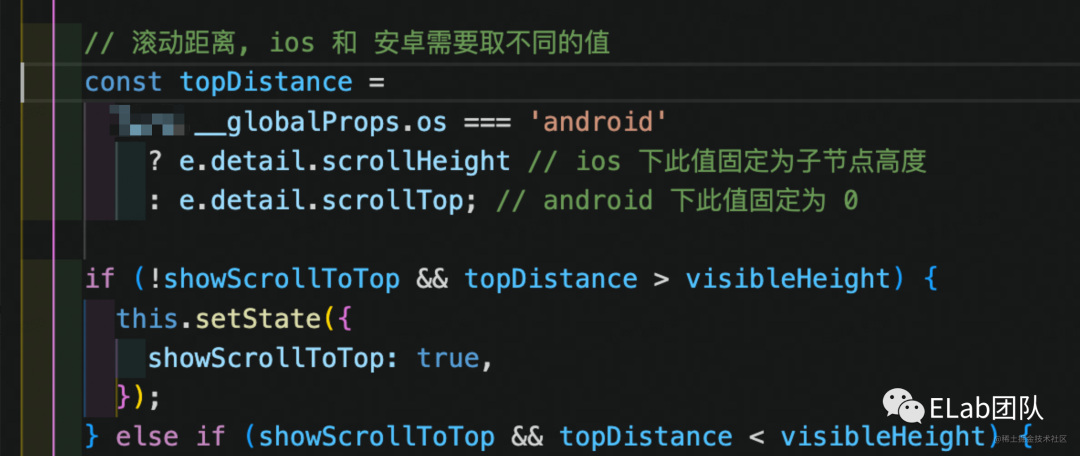
Stylelint 插件和 eslint 插件的区别主要是
但是整体的思想都是一样的,css 的节点类型也少很多,可以参考https://github.com/postcss/postcss/blob/main/docs/writing-a-plugin.md
Root: 根节点,指代当前 css 文件AtRule: @开头的一些属性,如 @mediaRule: 常用的 css 选择器Declaration: 键值对,如 color: redComment: 注释内部跨端框架 的 ttss 最多支持两层的 css 组合选择器,即下面是可行的
div div {}
而下面是不行的
div div div {}
而对于 less
.a {
&-b {
&-c {
}
}
}
/////
.a-b-c {}其实只有一层,所以我们的代码需要注意这点
首先建立一个文件叫 cpf-style-plugin.js
const stylelint = require('stylelint');
const { ruleMessages, report } = stylelint.utils;
const ruleName = 'cpf-style-plugin/max-depth-2';
const messages = ruleMessages(ruleName, {
//… linting messages can be specified here
expected: '不允许三层',
test: (...any) => `${JSON.stringify(any)}xxx`,
});
module.exports.ruleName = ruleName;
module.exports.messages = messages;
module.exports = stylelint.createPlugin(ruleName, function ruleFunction() {
return function lint(postcssRoot, postcssResult) {
function helperDep(n, dep) {
if (n.nodes) {
n.nodes.forEach((newNode) => {
if (newNode.type === 'rule') {
const selectorNum = newNode.selector
.split(' ')
.reduce((p, c) => p + (/^[a-zA-z.#].*/.test(c) ? 1 : 0), 0);
if (dep + selectorNum > 2) {
report({
message: messages.expected,
node: newNode,
result: postcssResult,
});
}
helperDep(newNode, dep + selectorNum);
}
});
}
}
helperDep(postcssRoot, 0);
};
});这里有区别的是,eslint 都是对标准语法树进行操作,而这里的 css 树,准确来说应该是 less 的 ast 树,并不会先转成 css 再进行我们的 lint 操作,因此我们需要考虑 rule 节点可能以 & 开头,也导致写法上有一点别扭。
使用的话只需要更改 stylelintrc.js 即可
module.exports = {
snippet: ['less'],
extends: "stylelint-config-standard",
plugins: ['./cpf-style-plugin.js'],
rules: {
'color-function-notation': 'legacy',
'cpf-style-plugin/max-depth-2': true,
}
}看一下效果
你可能会觉得 live code 和 ast 有啥关系,只不过是放入 new Function即可,但是形如 import export等功能,利用字符串匹配实现是不太稳定的,我们可以利用 AST 来实现这些方法,这里为了简洁,最后一行表示 export default,思想是一样的,利用 AST 查找到我们需要的参数即可。
https://codesandbox.io/s/react-live-editor-3j7t2?file=/src/index.js
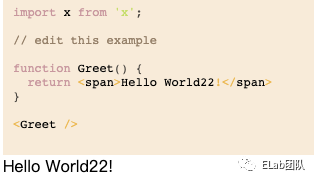
其中编辑器的部分负责代码的样式,使用的是 react-simple-code-editor[11],主要的用法如下
<Editor
value={code}
onValueChange={code => {xxx}}
/>所以主要的工作在获取编辑器代码之后的工作
1 . 首先我们需要将 JSX 代码转换为 es5 代码,这里用到 @babel/standalone[12],这是一个环境使用的 babel 插件,可以这么使用
import { transform as babelTransform } from "@babel/standalone";
const tcode = babelTransform(code, { presets: ["es2015", "react"] }).code;2 . 然后我们需要获取最后一行代码 <Greet /> 并将其转化为,其实也就是找到 React.createElement(Greet) 这个,这里就可以使用 ast 进行查找。过程略过,我们得到了这个节点 rnode,最后将这个rnode 转换为 React.createElement,我们最终得到了这样的代码
code = "'use strict';
var _x = _interopRequireDefault(require('x'));
function _interopRequireDefault(obj) {
return obj && obj.__esModule ? obj : { default: obj };
}
function Greet() {
return React.createElement('span', null, 'Hello World!');
}
render(React.createElement(Greet, null));"3 . 将上述的代码塞入 new Function 中执行。
const renderFunc = return new Function("React", "render", "require", code);
4 . 最后执行上述的代码
import React from "react";
function render(node) {
ReactDOM.render(node, domElement);
}
function require(moduleName) {
// 自定义
}
renderFunc(React, render, require)[1] estree: https://github.com/estree/estree
[2] acorn: https://github.com/acornjs/acorn
[3] Esprima: https://github.com/jquery/esprima
[4] Shift: https://github.com/shapesecurity/shift-parser-js
[5] 测试地址: https://esprima.org/test/compare.html
[6] astring: https://www.npmjs.com/package/astring
[7] recast: https://www.npmjs.com/package/recast
[8] espree: https://github.com/eslint/espree
[9] acorn: https://github.com/acornjs/acorn
[10] @typescript-eslint/parser: https://typescript-eslint.io/docs/linting/
[11] react-simple-code-editor: https://www.npmjs.com/package/react-simple-code-editor
[12] @babel/standalone: https://babeljs.io/docs/en/babel-standalone
本文由哈喽比特于3年以前收录,如有侵权请联系我们。
文章来源:https://mp.weixin.qq.com/s/zd8x5Om2psKfrZLfL9Og-A
京东创始人刘强东和其妻子章泽天最近成为了互联网舆论关注的焦点。有关他们“移民美国”和在美国购买豪宅的传言在互联网上广泛传播。然而,京东官方通过微博发言人发布的消息澄清了这些传言,称这些言论纯属虚假信息和蓄意捏造。
日前,据博主“@超能数码君老周”爆料,国内三大运营商中国移动、中国电信和中国联通预计将集体采购百万台规模的华为Mate60系列手机。
据报道,荷兰半导体设备公司ASML正看到美国对华遏制政策的负面影响。阿斯麦(ASML)CEO彼得·温宁克在一档电视节目中分享了他对中国大陆问题以及该公司面临的出口管制和保护主义的看法。彼得曾在多个场合表达了他对出口管制以及中荷经济关系的担忧。
今年早些时候,抖音悄然上线了一款名为“青桃”的 App,Slogan 为“看见你的热爱”,根据应用介绍可知,“青桃”是一个属于年轻人的兴趣知识视频平台,由抖音官方出品的中长视频关联版本,整体风格有些类似B站。
日前,威马汽车首席数据官梅松林转发了一份“世界各国地区拥车率排行榜”,同时,他发文表示:中国汽车普及率低于非洲国家尼日利亚,每百户家庭仅17户有车。意大利世界排名第一,每十户中九户有车。
近日,一项新的研究发现,维生素 C 和 E 等抗氧化剂会激活一种机制,刺激癌症肿瘤中新血管的生长,帮助它们生长和扩散。
据媒体援引消息人士报道,苹果公司正在测试使用3D打印技术来生产其智能手表的钢质底盘。消息传出后,3D系统一度大涨超10%,不过截至周三收盘,该股涨幅回落至2%以内。
9月2日,坐拥千万粉丝的网红主播“秀才”账号被封禁,在社交媒体平台上引发热议。平台相关负责人表示,“秀才”账号违反平台相关规定,已封禁。据知情人士透露,秀才近期被举报存在违法行为,这可能是他被封禁的部分原因。据悉,“秀才”年龄39岁,是安徽省亳州市蒙城县人,抖音网红,粉丝数量超1200万。他曾被称为“中老年...
9月3日消息,亚马逊的一些股东,包括持有该公司股票的一家养老基金,日前对亚马逊、其创始人贝索斯和其董事会提起诉讼,指控他们在为 Project Kuiper 卫星星座项目购买发射服务时“违反了信义义务”。
据消息,为推广自家应用,苹果现推出了一个名为“Apps by Apple”的网站,展示了苹果为旗下产品(如 iPhone、iPad、Apple Watch、Mac 和 Apple TV)开发的各种应用程序。
特斯拉本周在美国大幅下调Model S和X售价,引发了该公司一些最坚定支持者的不满。知名特斯拉多头、未来基金(Future Fund)管理合伙人加里·布莱克发帖称,降价是一种“短期麻醉剂”,会让潜在客户等待进一步降价。
据外媒9月2日报道,荷兰半导体设备制造商阿斯麦称,尽管荷兰政府颁布的半导体设备出口管制新规9月正式生效,但该公司已获得在2023年底以前向中国运送受限制芯片制造机器的许可。
近日,根据美国证券交易委员会的文件显示,苹果卫星服务提供商 Globalstar 近期向马斯克旗下的 SpaceX 支付 6400 万美元(约 4.65 亿元人民币)。用于在 2023-2025 年期间,发射卫星,进一步扩展苹果 iPhone 系列的 SOS 卫星服务。
据报道,马斯克旗下社交平台𝕏(推特)日前调整了隐私政策,允许 𝕏 使用用户发布的信息来训练其人工智能(AI)模型。新的隐私政策将于 9 月 29 日生效。新政策规定,𝕏可能会使用所收集到的平台信息和公开可用的信息,来帮助训练 𝕏 的机器学习或人工智能模型。
9月2日,荣耀CEO赵明在采访中谈及华为手机回归时表示,替老同事们高兴,觉得手机行业,由于华为的回归,让竞争充满了更多的可能性和更多的魅力,对行业来说也是件好事。
《自然》30日发表的一篇论文报道了一个名为Swift的人工智能(AI)系统,该系统驾驶无人机的能力可在真实世界中一对一冠军赛里战胜人类对手。
近日,非营利组织纽约真菌学会(NYMS)发出警告,表示亚马逊为代表的电商平台上,充斥着各种AI生成的蘑菇觅食科普书籍,其中存在诸多错误。
社交媒体平台𝕏(原推特)新隐私政策提到:“在您同意的情况下,我们可能出于安全、安保和身份识别目的收集和使用您的生物识别信息。”
2023年德国柏林消费电子展上,各大企业都带来了最新的理念和产品,而高端化、本土化的中国产品正在不断吸引欧洲等国际市场的目光。
罗永浩日前在直播中吐槽苹果即将推出的 iPhone 新品,具体内容为:“以我对我‘子公司’的了解,我认为 iPhone 15 跟 iPhone 14 不会有什么区别的,除了序(列)号变了,这个‘不要脸’的东西,这个‘臭厨子’。









